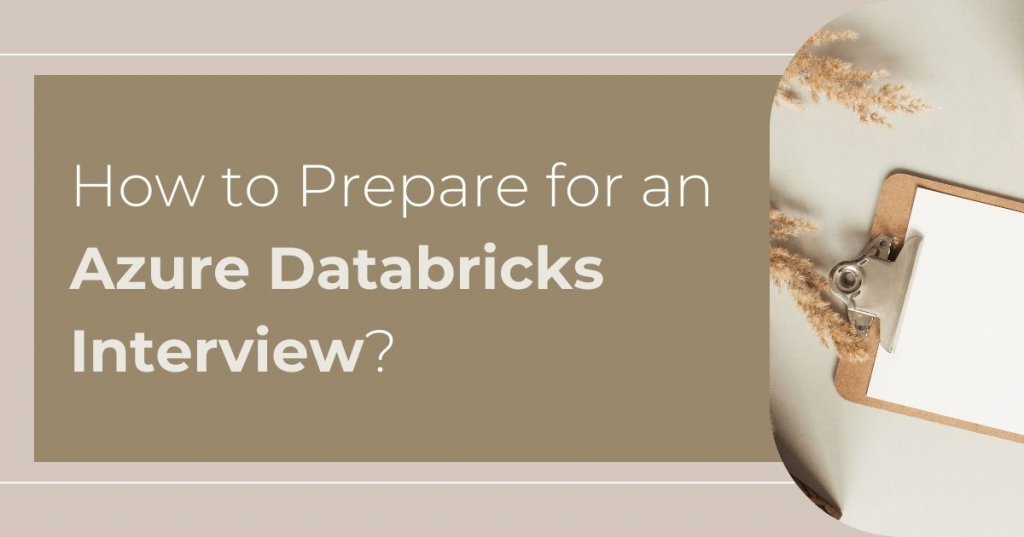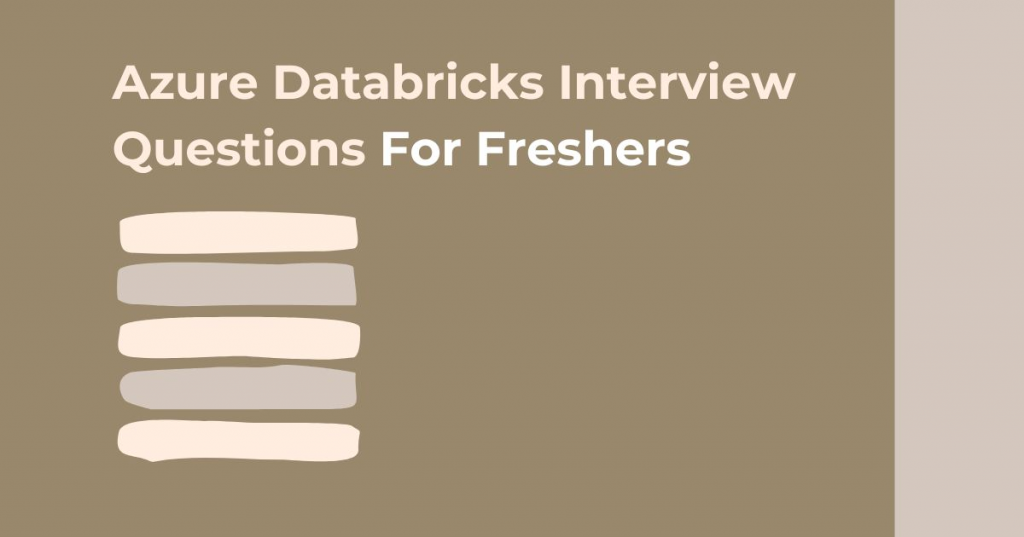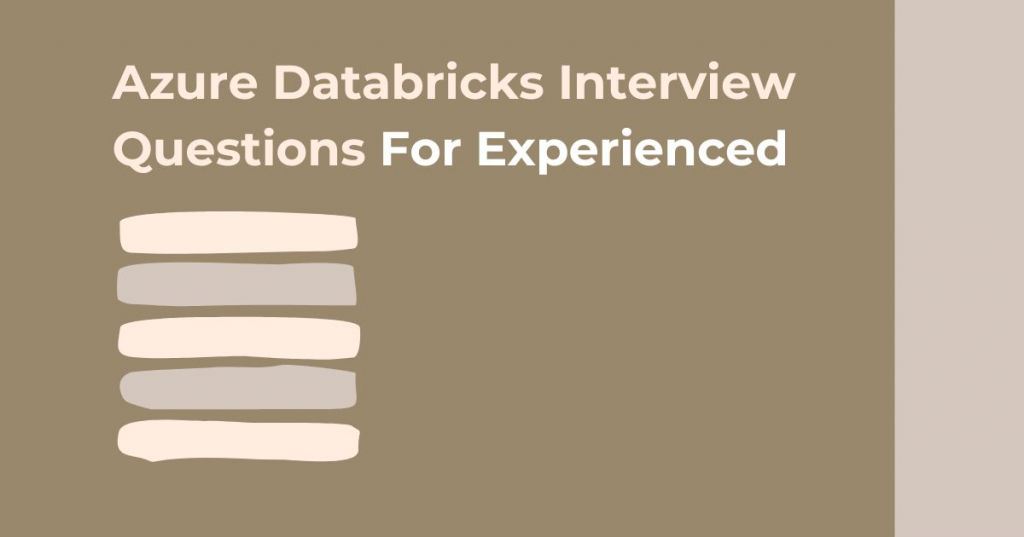TOP 40+ Azure Databricks Interview Questions & Tips
Azure Databricks has emerged as a powerhouse in the world of big data and cloud computing, enabling organizations to harness the full potential of Apache Spark for data engineering, analytics, and machine learning. With its unified platform, seamless integration with Azure services, and robust capabilities, Databricks is rapidly becoming a sought-after skill for data professionals.
Whether you're a fresher eager to embark on your data career or an experienced engineer looking to level up your expertise, landing a Databricks role requires more than just technical know-how. It demands a strategic approach to showcase your skills, knowledge, and problem-solving abilities.
This comprehensive guide by SkillTrans is designed to equip you with the knowledge and confidence to conquer your Azure Databricks interview. We'll delve into:
Essential Preparation: Uncover the key areas you need to master to stand out as a top candidate.
Showcasing Your Experience: Learn how to effectively communicate your Databricks expertise and highlight your accomplishments.
Targeted Interview Questions: Practice with questions specifically tailored for both freshers and experienced professionals, ensuring you're ready for any challenge.
By the end of this blog post, you'll be armed with the tools and insights to navigate the Databricks interview process with confidence, leaving a lasting impression on potential employers.
Let's dive in and unlock the door to your dream Databricks career!
How to Prepare for an Azure Databricks Interview

Landing a job in the rapidly evolving field of big data and cloud computing requires more than just technical skills. It demands a strategic approach to interview preparation.
If you're eyeing a role that involves Azure Databricks, this guide will equip you with the knowledge and insights to stand out and showcase your expertise.
In-Depth Understanding of Databricks and Spark
Spark Architecture: Master the core concepts of Spark's architecture (Resilient Distributed Datasets, DataFrames, and the driver/executor model).
Databricks Ecosystem: Know how Databricks extends Spark's capabilities with features like collaborative notebooks, cluster management, and integrated machine learning tools.
Optimization Techniques: Be prepared to discuss how to optimize Spark jobs for performance and efficiency.
Azure Cloud Fundamentals
Integration: Explain how Databricks integrates with other Azure services (e.g., Azure Blob Storage, Azure Data Factory).
Security: Understand security best practices in the Azure environment (e.g., role-based access control, encryption).
Cost Optimization: Demonstrate your ability to design cost-effective solutions on Azure.
Practical Experience
Real-World Projects: Showcase your hands-on experience with Databricks. Be ready to describe projects you've worked on, the challenges you faced, and how you solved them.
Code Examples: Practice writing Spark code in Python or Scala to solve common data processing and analysis tasks.
Behavioral Skills
Communication: Articulate your thought process clearly and concisely. Be prepared to explain complex concepts in simple terms.
Problem-Solving: Highlight your ability to analyze data-related problems and propose effective solutions.
Collaboration: Show that you can work effectively in a team environment, which is essential for many data-centric roles.
What’s more?
Research the Company: Understand the company's specific use cases for Azure Databricks.
Practice with Mock Interviews: Simulate the interview experience to get comfortable answering questions under pressure.
Stay Current: Keep up with the latest developments in the Databricks and Azure ecosystems.
How to Showcase Your Azure Databricks Experience

Effectively communicating your experience with Azure Databricks is crucial to demonstrating your value to potential employers. Here's how to translate your skills and knowledge into a compelling narrative:
Quantify Your Impact
Quantifying your impact is important, reflecting in detail your work performance and showing that you have professional presentation skills. Consider using:
Metrics: Use numbers to illustrate the results you achieved with Databricks. Did you reduce processing time by a certain percentage? Increase data accuracy? Scale a project to handle a massive dataset?
Business Value: Connect your technical work to tangible business outcomes. Did your Databricks implementation lead to faster decision-making, cost savings, or new revenue streams?
Highlight Your Technical Expertise
“The only way to do great work is to love what you do.” - Steve Jobs.
Try to highlight your qualifications as best as possible, helping the interviewer see how much you like the job, thereby understanding your abilities better. Consider using:
Spark Proficiency: Describe your level of experience with Spark (e.g., beginner, intermediate, advanced). Explain how you've used Spark's core components (RDDs, DataFrames) to manipulate and analyze data.
Databricks Features: Showcase your familiarity with key Databricks features. Have you used Delta Lake for reliable data storage? Built machine learning models with MLflow? Leveraged interactive notebooks for collaborative development?
Azure Integration: Detail your experience integrating Databricks with other Azure services. Have you used Azure Data Factory for data pipelines? Connected Databricks to Azure Blob Storage or Data Lake Storage?
Tell a Story with Project Examples
There's nothing more engaging than describing your experiences through storytelling. Consider using:
Problem-Solution-Result: Structure your project descriptions to clearly outline the problem you faced, the solution you implemented with Databricks, and the positive results you achieved.
Technical Depth: Delve into the specific Databricks tools and techniques you employed. Mention the programming languages (Python, Scala, SQL) you used.
Challenges and Learnings: Discuss any obstacles you encountered and how you overcame them. Highlight the lessons you learned along the way.
Prepare for Technical Questions
Last but not least, prepare answers to questions you may encounter during the interview. This will help you understand your abilities better and answer better when facing the employer. Consider preparing:
Coding Exercises: Be ready to write or analyze Spark code during the interview.
Scenario-Based Questions: Expect questions like, "How would you optimize a slow-running Databricks job?" or "How would you design a data pipeline using Databricks and Azure services?"
Behavioral Questions: Be prepared to answer questions about your problem-solving approach, teamwork skills, and ability to adapt to new technologies.
Pro Tip: Create a portfolio of Databricks projects, including code snippets and summaries of your contributions. This can serve as a tangible demonstration of your skills.
Azure Databricks Interview Questions For Freshers

Kickstart your Databricks career with confidence! This curated list of questions will help you prepare for technical interviews and demonstrate your understanding of fundamental concepts.
Technical Questions for Freshers
Explain the key differences between Spark RDDs, DataFrames, and Datasets. Which one would you prefer for most use cases and why?
Describe the architecture of a Spark cluster in Databricks. What are the roles of the driver and executors?
What are Delta Lake tables, and what advantages do they offer over traditional data storage formats in Databricks?
How does Databricks integrate with Azure Blob Storage and Azure Data Lake Storage? When would you choose one over the other?
Explain the concept of "lazy evaluation" in Spark. How does it contribute to Spark's performance optimization?
What is the purpose of the cache() and persist() functions in Spark? How do they differ?
How would you handle data skew in a Spark job? What are some common techniques to mitigate its impact on performance?
What is a Databricks notebook? Describe how you would use it for collaborative development and data exploration.
What are the different types of Databricks clusters (Standard, High Concurrency, etc.)? How do you choose the right cluster type for a specific workload?
Explain the role of MLflow in Databricks. How does it help in managing machine learning experiments and model deployment?
Conceptual Questions for Freshers
What are the benefits of using Azure Databricks over traditional on-premises Spark deployments?
How does Databricks ensure the security of your data and code in the cloud environment?
Describe a scenario where you would choose Databricks over Azure Synapse Analytics for a big data project.
What are some common challenges you might face when working with Databricks, and how would you address them?
How do you stay updated with the latest features and best practices in Azure Databricks?
Scenario-Based Questions for Freshers
Imagine you have a large dataset in Azure Blob Storage. Explain how you would ingest that data into Databricks and transform it using Spark.
You have a Spark job that is running slower than expected. What steps would you take to optimize its performance?
You need to build a real-time data pipeline in Databricks. Which tools and technologies would you use, and why?
You have a machine learning model developed in Databricks. How would you deploy and monitor it in production?
How would you approach designing a data lakehouse architecture using Azure Databricks and Delta Lake?
Azure Databricks Interview Questions For Experienced

If you're an experienced data professional aiming to showcase your advanced Databricks skills, these questions will challenge you and highlight your in-depth understanding of the platform.
Advanced Technical Questions for Experienced
Explain the differences between Databricks Runtime versions (e.g., Standard, ML, Genomics). When would you choose one over another?
Describe how you would implement a streaming data pipeline in Databricks using Structured Streaming. What considerations would you have for fault tolerance and state management?
What is the difference between Delta Lake's "merge" operation and a traditional "upsert"? When would you use each one?
Explain how to optimize Spark SQL queries in Databricks. What are some common performance bottlenecks to watch out for?
Describe how you would use Databricks Connect to integrate Databricks with your local development environment.
What is the role of the Databricks File System (DBFS)? How does it interact with cloud storage like Azure Blob Storage?
Explain how you would use Databricks to implement an end-to-end machine learning workflow, from data preparation to model deployment and monitoring.
How would you implement access control and security for Databricks notebooks and data assets?
What are the best practices for managing Databricks clusters to ensure cost efficiency and performance?
How does Databricks Autoscaling work? Explain the benefits and considerations when using this feature.
Advanced Conceptual Questions for Experienced
What are some advanced features of Delta Lake (e.g., time travel, schema evolution, data versioning) that make it well-suited for data lakehouse architectures?
Discuss the pros and cons of using Databricks SQL Analytics for querying Delta Lake tables versus using Spark SQL directly.
How does Databricks handle data governance and lineage tracking? What tools and practices would you recommend?
Explain how you would integrate Databricks with other Azure services like Azure Data Factory, Azure Synapse Analytics, or Azure Machine Learning.
What are some emerging trends and technologies in the Databricks ecosystem that you find particularly exciting?
Advanced Scenario-Based Questions for Experienced
You have a large Databricks job that consistently fails due to memory issues. How would you troubleshoot and resolve this problem?
Design a solution for real-time fraud detection using Databricks and streaming data from Kafka.
You have a requirement to process and analyze petabytes of data in Databricks. How would you architect and optimize this solution for scale and performance?
You need to implement a data quality framework for a Databricks environment. What tools and processes would you put in place?
How would you approach migrating a large on-premises Hadoop cluster to Azure Databricks? What are the key considerations and challenges?
Discover additional learning opportunities with Skilltrans’ range of related courses. Please click on the course name below to learn more:
Learning Microsoft Azure -A Hands-On Training [Azure][Cloud]
This course can be taken by absolute beginners including candidates with non-technical backgrounds, such as those involved in selling or purchasing cloud-based solutions and services, or who have some involvement with cloud-based solutions and services, as well as those with a technical background who have a need to validate their foundational-level knowledge around cloud services and Azure.
The course is intended to help people learn Azure concepts quickly and give enough practice exercises to get them started with their cloud journey with a specific focus on Microsoft Azure.
Mobile DevOps: Release Xamarin Apps Automatically
In the "Mobile DevOps: Release Xamarin Apps Automatically" course, lecturer is going to show you how to quickly and easily set up the automated build and release process, that will:
Build both iOS and Android versions of your Xamarin app AUTOMATICALLY every time there is a change
Run tests on every build, so that those sneaky bugs don't end up in the production
Continuously release BETA VERSIONS to your QA team, without you having to do anything about it
And finally, how to push QA-approved versions of your Xamarin app directly to the APP STORES, much faster than before. So that customers can sooner enjoy your new features!
Conclusion
The demand for skilled Azure Databricks professionals is soaring as organizations increasingly embrace cloud-based big data solutions. Whether you're a fresher just starting your journey or an experienced data engineer seeking your next challenge, thorough preparation is key to acing your Azure Databricks interview.
By focusing on your technical proficiency, showcasing real-world project experience, and demonstrating your soft skills, you'll be well-equipped to impress potential employers.
Remember, the questions outlined in this guide are just a starting point. Continuously expand your knowledge, stay updated with the latest Databricks advancements, and actively engage with the Databricks community to solidify your expertise.
With the right preparation and a passion for data-driven innovation, you'll be well on your way to securing a rewarding career in the exciting world of Azure Databricks.
Additional Resources to Boost Your Preparation:
Databricks Official Documentation: A treasure trove of information on all aspects of Databricks.
Databricks Community: Connect with fellow users and experts to share knowledge and learn from others' experiences.
Online Courses: Consider taking specialized courses on Databricks and Spark to deepen your understanding.
Mock Interviews: Practice answering interview questions in a realistic setting to build confidence and identify areas for improvement.
Best of luck on your Azure Databricks interview journey! We hope this guide has been helpful in providing you with the tools and insights needed to succeed.

Meet Hoang Duyen, an experienced SEO Specialist with a proven track record in driving organic growth and boosting online visibility. She has honed her skills in keyword research, on-page optimization, and technical SEO. Her expertise lies in crafting data-driven strategies that not only improve search engine rankings but also deliver tangible results for businesses.



